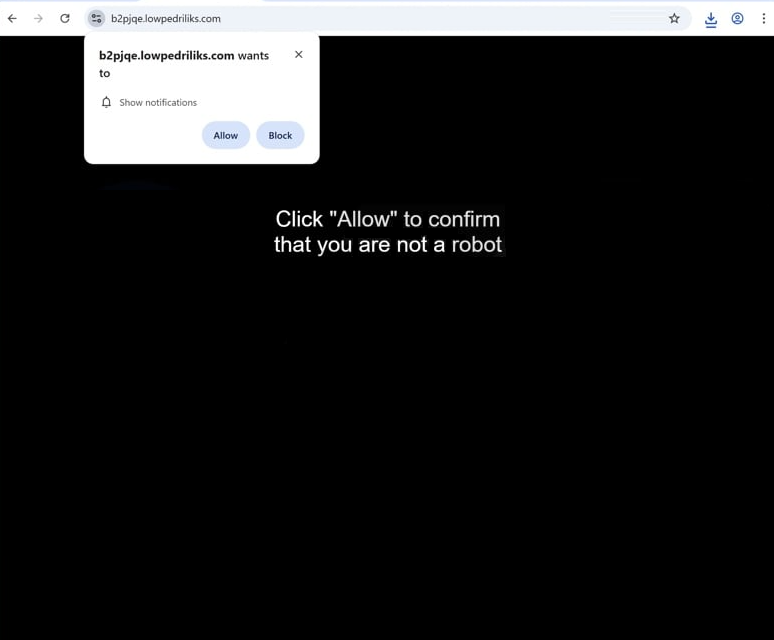Remove lowpedriliks.com pop-up notifications
lowpedriliks.com is a fraudulent website designed to deceive users into enabling desktop notifications. Upon being redirected to the site, a browser alert will promptly appear, saying “lowpedriliks.com wants to show notifications”. By exploiting a legitimate browser feature, this site attempts to trick users into agreeing to see desktop ads. If you click “Allow” on that browser alert, ads will start being displayed on your desktop. These ads can pose significant risks, potentially exposing users to harmful content such as malware and scams. Fortunately, if permission has been granted, it can be easily revoked through the browser’s settings.
lowpedriliks.com has nothing on it, displaying only a message saying you need to click “Allow” to confirm you are not a robot. This is referring to the browser alert saying “lowpedriliks.com wants to show notifications”. By clicking “Allow”, you will permit the website to display advertisements on your desktop. The biggest issue with these ads is that they may resemble legitimate system alerts, potentially misleading you into interacting with them. It is recommended not to engage with any of these notifications, as they may redirect you to malicious sites promoting scams or hosting malware.
Although the “show notifications” feature is often exploited by sites like lowpedriliks.com, it is a legitimate feature. Trusted websites can use it to provide convenient updates on content. If you regularly visit a particular site, you may choose to enable notifications to see the content. You can easily revoke this permission via your browser’s settings.
It is recommended to scan your computer with WiperSoft to check for a possible adware infection. Additionally, you should use an ad blocker program because it will block intrusive advertisements and redirects, especially when browsing potentially unsafe websites.
What triggers redirects to sites like anesibulmiseed.com
Redirects to sites like lowpedriliks.com generally happen because users browse ad-heavy sites without an ad blocker. To generate revenue, these sites bombard users with ads. Sites that have pirated or adult content are particularly notorious for this. Luckily, most ad blockers effectively block both ads and redirects.
Redirects can also be caused by adware, browser hijackers, or other similar infections, which are typically installed through software bundling. This method allows said threats to be bundled with free programs as extra offers, which are hidden in settings that users do not check. To avoid these unwanted installations, users need to manually deselect them. Because of the deceptive nature of this method, programs using software bundling are usually flagged as potential threats by anti-virus programs.
As long as you pay attention when installing free programs, you should be able to prevent unwanted programs. When installing a free program, always choose Advanced settings. Default settings automatically approve all bundled extras, while Advanced settings reveal them, allowing users to opt out. It’s best to always uncheck these offers, even if they seem helpful, as they usually just add unnecessary clutter to your system.
How to stop anesibulmiseed.com redirects
Use the WiperSoft anti-virus program to scan your computer, as the redirects you are encountering may indicate an adware infection. Such infections are typically resolved most effectively with reliable anti-virus software. Additionally, using an ad blocker can help prevent redirects and block unwanted ads.
If you need assistance with revoking a site’s permission to show notifications, instructions are provided below. In addition to removing lowpedriliks.com, ensure that you delete any other unfamiliar sites. If you wish to stop receiving notifications entirely, you can disable the notification feature as well.
- For Mozilla Firefox: Open Menu (the three bars top-right corner) -> Options -> Privacy & Security. Scroll down to Permissions, press Settings next to Notifications, and remove lowpedriliks.com and any other questionable websites. You can permanently turn off these notification requests by checking the “Block new requests asking to allow notifications” box in the same Notifications settings.
- For Google Chrome: Open Menu (the three dots top-right corner) -> Settings -> Privacy and security -> Site Settings. Click on Notifications under Permissions, and remove lowpedriliks.com and any other questionable websites. You can stop these notification requests permanently by toggling off “Sites can ask to send notifications”.
- For Microsoft Edge: Open Menu (the three dots top-right corner) -> Settings -> Cookies and site permissions -> Notifications. Review which sites have permission and remove lowpedriliks.com and any other questionable websites. You can permanently turn off these notification requests by toggling off “Ask before sending”.
Site Disclaimer
WiperSoft.com is not sponsored, affiliated, linked to or owned by malware developers or distributors that are referred to in this article. The article does NOT endorse or promote malicious programs. The intention behind it is to present useful information that will help users to detect and eliminate malware from their computer by using WiperSoft and/or the manual removal guide.
The article should only be used for educational purposes. If you follow the instructions provided in the article, you agree to be bound by this disclaimer. We do not guarantee that the article will aid you in completely removing the malware from your PC. Malicious programs are constantly developing, which is why it is not always easy or possible to clean the computer by using only the manual removal guide.

